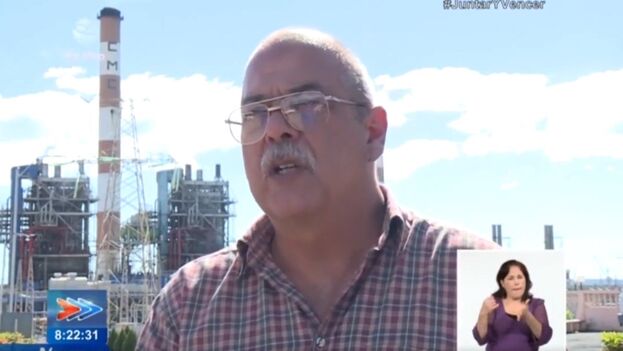
![]() 14ymedio, Elías Amor Bravo, Economist, 1 October 2023 — Not many days ago, Cuba’s Minister of Energy, Vicente de la O Levy, announced the great success of drilling a third gas well that would allow the joint venture Energas to increase electricity generation. The state press welcomed the information as if it were the solution that all Cubans were expecting.
14ymedio, Elías Amor Bravo, Economist, 1 October 2023 — Not many days ago, Cuba’s Minister of Energy, Vicente de la O Levy, announced the great success of drilling a third gas well that would allow the joint venture Energas to increase electricity generation. The state press welcomed the information as if it were the solution that all Cubans were expecting.
This year two wells had already been drilled, in the months of May and June, to provide 14,125,867 cubic feet of gas and thereby increase electricity generation. In those months, 330 MW of power were not available due to lack of fuel, and before this, the electricity moved between 250 and 260 MW.
De la O Levy then announced, surprisingly, that Energás would begin a mandatory maintenance process, which had been delayed since May, so that the plant in question could go into operation on October 3, with higher generation power thanks to the third well.
And here comes something eye-catching. A few days later, the state press reported that there would be an immediate impact on the manufactured gas service in Havana, because the maintenance work at the Energas production plant would cause a decrease in the volume of natural gas that is supplied to the capital from 9:00 pm on Sunday, October 1 until 6:00 am on Tuesday, October 3. So one is broken; one is disconnected, and the third well is at rock-bottom.
The service impact, which could be partial or total but wasn’t clarified, would be felt in the municipalities of Plaza de la Revolución, Cerro, Old Havana, Central Havana, 10 de Octubre, Playa and Marianao.
Citizens don’t know what to say. On the one hand, they have a minister who announces more gas supply, and on the other, the directors of the entity responsible for the service who, as a result of the maintenance work, decide to reduce it. A few weeks ago, similar work in the Refrigeration Section of Energas began on September 20 and produced a bad smell of gas in numerous areas of the capital that alarmed the population.
So despite the drilling of a third well and the construction of a 13-mile pipeline whose valves are closed, residents in Havana will have to settle for cuts in the gas supply.
Nobody understands how these setbacks can occur in something as standardized as continuously providing electricity service to consumers. Apparently, the strategy followed since February to increase the hours of planned maintenance, in order to recover power and not have to make repairs, is partly responsible for the breakdown in the service.
Nor have new investments that should guarantee the stability of the electricity service served to increase consumption. So the fuel supply and the technical status of thermoelectric plants continue to be the vectors that distance the Castro electricity sector from any solution to the serious problems.
And of course, since there is no way to solve the energy crisis that grips the country, the minister attributes to the U.S. economic blockade the sole responsibility for an energy policy that responds to the terrible design of the communist economic model, inadequate to meet the needs, which exerts a key influence on the normal functioning of the entire country.
The company suggests that the completion of the repair work will allow greater reliability in the distribution of natural gas to the production plants of the Manufactured Gas Company, but consumers hardly believe these arguments, because the same problems of supply and blackouts continue.
This is the day-to-day of Castroism. The propaganda and demagogy of the regime on the one hand announce new wells that will solve all the problems and on the other, facts without solutions. Cubans are aware of the dynamics of these events, and after almost two long years of poor service, they have lost all hope.
The daily reports about the service published in the state press as warnings of what cannot be avoided are unique in the world. There is no other country in which citizens have this type of terrible service and are also informed by the government of the distribution of consumption.
Translated by Regina Anavy
____________________
COLLABORATE WITH OUR WORK: The 14ymedio team is committed to practicing serious journalism that reflects Cuba’s reality in all its depth. Thank you for joining us on this long journey. We invite you to continue supporting us by becoming a member of 14ymedio now. Together we can continue transforming journalism in Cuba.
